
Discover more from Creative Leadership
Does Your Experience Surprise People?
How the "Science of Surprise" requires us to break rules when creating experiences
Words are important.
Whether to call an attraction a museum or vice versa is often a matter of debate. On one side, people talked about how the word “museum” comes with a lot of baggage. From famous movies like Night at the Museum to childhood field trips, our perceptions are shaped by our experiences with dusty artifacts and signs that proclaim: “Do Not Touch.” However, when people think of “attractions” it’s often something with no redeeming value beyond simply having fun. Sometimes, people have even tried to invent new words like the painful “edutainment” to try and split the difference.
So much of these debate about what to call a project comes down to expectations. Should you meet someone’s expectations or surprise them? In fact, the very definition of surprise is “a feeling of astonishment caused by something unexpected.”
surprise |sə(r)ˈprīz|
Noun
1 an unexpected or astonishing event.
• a feeling of astonishment caused by something unexpected.
Surprise is, no doubt, a powerful emotion. From plot twists and cliffhangers to spoilers and viral videos, a surprise can generate a lot of attention—and attendance. There’s nothing sweeter than a great surprise.
In our work, we recently came across a cool quote. In his book Complexification about the “Science of Surprise,” the renowned mathematician John Casti argues two key points. First, that “the word surprise represents the difference between expectations and reality.” And second, that “surprise can only arise out of consequence of...breaking rules.”
So, that begs two questions when embarking on any experience project—whether it’s for a museum, brand experience or entertainment attraction:
“What would people expect to see?
“And what rules should we break?”
When it comes to museums, guests usually expect to see history exhibits, artifacts, films or art displays. In fact, the word “museum” communicates expectations for people. Fortunately, those expectations have been transformed over the years by innovative designs. The World of Coke is indeed a museum about Coca Cola, but everyone knows it’s an attraction that one reviewer called “a must-see for anybody who's ever had a taste of the Real Thing.”
The Lockheed Martin Space Experience Center in Washington, D.C. features, as every
museum should, rare artifacts such as a wind tunnel model of the Martin X-24 Lifting Body, but guests can also sit down in a sci-fi lounge and play Missile Command while a Darth Vader Popcorn Popper delivers them a fresh snack to complement their freeze dried ice cream.
The definition of a museum has changed so much that the American Alliance of Museums published an essay in 2011 by Professor Eugene Dillenburg (and no, we didn’t make his name up) trying to answer a simple question: “What, if anything, is a museum?”
In the end, the professor of museum studies concluded that the most important thing a museum can do is provide people with an experience. “Visitors do not receive it passively. They do not sit quietly and let it wash over them. Rather, they experience the museum with their full bodies, with all of their senses, sharing and exploring and moving through the space.”
And since we quoting people about experiences, perhaps we should also quote Jimi Hendrix: “Are you experienced?”
I once worked for the business author Tom Peters and he loved to write about experiences.
“An experience is holistic, total, encompassing, transforming and emotional. An experience is an event. A happening. An event-happening with a beginning, a middle and an end. An experience-event-happening leaves an indelible memory.”
The one word that might transcend museums, brands and attractions and will inspire a shared vision for all of us working on any project is the word “experience.”
And perhaps this is the word we should use when talking with people about what expectations we should dash and rules we should break. The best experiences go beyond just meeting our expectations by breaking the rules.
So, ask yourself today: “What rules should we break?”





